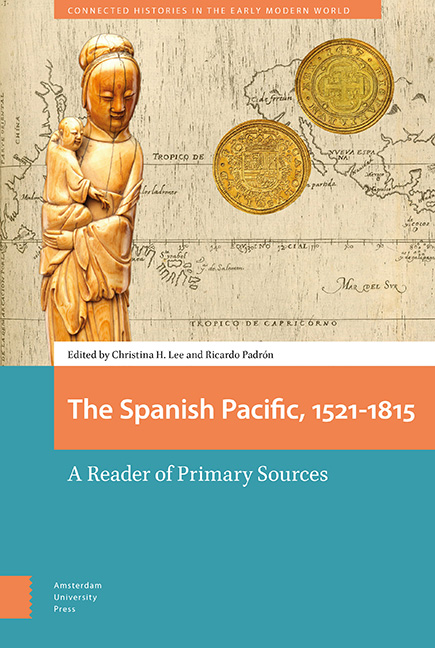Book contents
- Frontmatter
- Contents
- Abbreviations
- Acknowledgements
- Introduction
- 1 An Early Transpacific Account of the Spice Islands by Andrés de Urdaneta (1536)
- 2 Domingo de Salazar’s Letter to the King of Spain in Defense of the Indians and the Chinese of the Philippine Islands (1582)
- 3 Juan Cobo’s Map of the Pacific World (1593)
- 4 A Royal Decree of Philip III Regulating Trade between the Philippines and New Spain (1604)
- 5 Manila’s Sangleys and a Chinese Wedding (1625)
- 6 Don Luis Castilla Offers to Sell Land in Manila (1629)
- 7 Idolatry and Apostasy in the 1633 Jesuit Annual Letter
- 8 The Will of an Indian Oriental and her Chinos in Peru (1644
- 9 Francisco de Combés’s History of Mindanao and Jolo (1667)
- 10 Between Fiction and History in the Spanish Pacific The Misfortunes of Alonso Ramírez (1690)
- 11 A Moluccan Crypto-Muslim before the Transpacific Inquisition (1623–1645)
- 12 Constitutions and Rules of the Beatas Indias (1726)
- 13 The Poetics of Praise and the Demands of Confession in the Early Spanish Philippines: Notes and Documents
- 14 The Pacific Theater of the Seven Years’ War in a Latin Poem by an Indigenous Priest, Bartolomé Saguinsín (1766)
- 15 A Prohibition on Digging Up the Bones of the Dead (1813)
- Index
10 - Between Fiction and History in the Spanish Pacific The Misfortunes of Alonso Ramírez (1690)
Published online by Cambridge University Press: 20 November 2020
- Frontmatter
- Contents
- Abbreviations
- Acknowledgements
- Introduction
- 1 An Early Transpacific Account of the Spice Islands by Andrés de Urdaneta (1536)
- 2 Domingo de Salazar’s Letter to the King of Spain in Defense of the Indians and the Chinese of the Philippine Islands (1582)
- 3 Juan Cobo’s Map of the Pacific World (1593)
- 4 A Royal Decree of Philip III Regulating Trade between the Philippines and New Spain (1604)
- 5 Manila’s Sangleys and a Chinese Wedding (1625)
- 6 Don Luis Castilla Offers to Sell Land in Manila (1629)
- 7 Idolatry and Apostasy in the 1633 Jesuit Annual Letter
- 8 The Will of an Indian Oriental and her Chinos in Peru (1644
- 9 Francisco de Combés’s History of Mindanao and Jolo (1667)
- 10 Between Fiction and History in the Spanish Pacific The Misfortunes of Alonso Ramírez (1690)
- 11 A Moluccan Crypto-Muslim before the Transpacific Inquisition (1623–1645)
- 12 Constitutions and Rules of the Beatas Indias (1726)
- 13 The Poetics of Praise and the Demands of Confession in the Early Spanish Philippines: Notes and Documents
- 14 The Pacific Theater of the Seven Years’ War in a Latin Poem by an Indigenous Priest, Bartolomé Saguinsín (1766)
- 15 A Prohibition on Digging Up the Bones of the Dead (1813)
- Index
Summary
Abstract
Chapter Three of The Misfortunes of Alonso Ramírez, attributed to the Novohispanic polymath Carlos de Sigüenza y Góngora but widely believed to be based on a true account, tells the tale of the title character's captivity among English pirates, who supposedly torture him for the information they need to execute savage raids on Spanish positions in the Philippines, and then plunder their way from Cambodia to Madagascar and Brazil. Nicole Legnani situates the excerpt in the larger story told by the novel as a whole and discusses the novel's place in the broader context of colonial Latin American literature and its transpacific commitments.
Keywords: colonial Latin American literature; New Spain; picaresque; Sigüenza y Góngora
At the intersection of transpacific and transatlantic commerce, the Infortunios de Alonso Ramírez (1690) was produced in New Spain during the late seventeenth century. While the narrative's authorship is largely attributed to Carlos de Sigüenza y Góngora—polymath, polyglot, cosmographer, archivist, historian, and frustrated Jesuit of New Spain—since 2007 a critical consensus has been reached that identifies Alonso Ramírez as the primary source of the story published by Sigüenza y Góngora in 1690.
The Infortunios is considered a foundational text, one of a few that contend for the status of “first novel” in the Latin American lettered tradition, all the while it exceeds—as Yolanda Martínez-San Miguel (2008) has argued—the transatlantic paradigm. Various elements of the narrative herald the themes and positions taken by Latin American authors over the longue durée: hybrid genre, multiple authorship, the blurring of history and fiction, and the various plays on political authority as well as authorial voice in the text. At the same time, the travails narrated in the Infortunios serve as a reminder of the discontinuities as well as the continuities between the precarious conditions faced by peripatetic subjects in the Hispanic-inflected world, both in the seventeenth as well as the twenty-first centuries.
The itinerary of Alonso Ramírez's various misfortunes invites us to think of New Spain at the center of the Spanish empire, but also of Spain at the periphery of the Pacific theater where various European empires—including the Dutch, English, and Portuguese—competed for regional hegemony.
- Type
- Chapter
- Information
- Spanish Pacific, 1521–1815A Reader of Primary Sources, pp. 157 - 170Publisher: Amsterdam University PressPrint publication year: 2020



